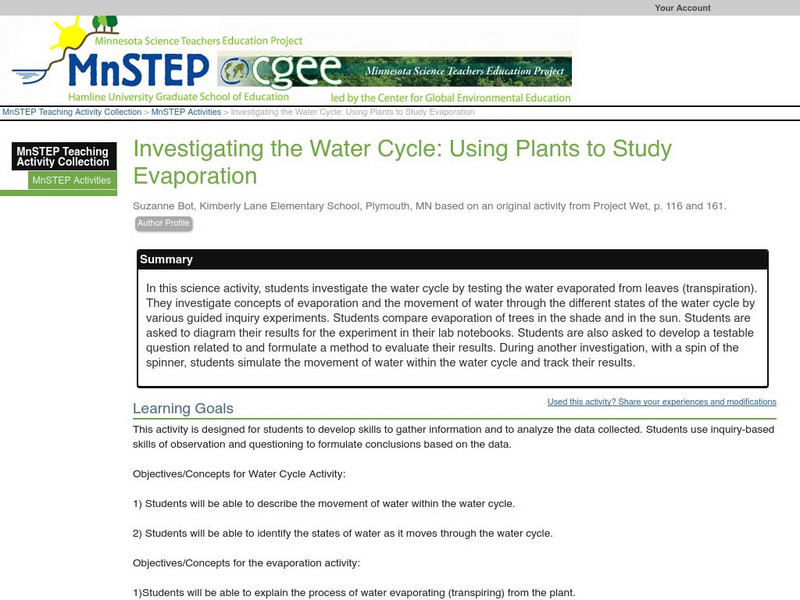Curated OER
Wonderful World of Bats
Students create a book about bats. They write a letter to a scientist containing questions about bats. They compare the socialization of bats to humans; compare the needs of bats to humans and other animals.
Curated OER
Lesson Plan: Global Warming
Students explore the concept of global warming. In this climate change instructional activity, students explore the provided links to PBS NOW sources and research the greenhouse effect and the effects of global warming. Students...
Curated OER
Sustainable Southern Belize: Coral Health Lesson Plan
Fifth graders investigate coral reefs and the dangers they face by labeling and drawing. In this oceanography lesson, 5th graders view a PowerPoint presentation of photographs of coral reefs in Belize. Students investigate...
Curated OER
Science: What Is a Barometer?
Fourth graders discover how barometers help to predict the weather. Using newspapers, they examine the weather forecast and determine the meaning of high and low as they pertain to pressure. After making cluster diagrams, 4th graders...
Curated OER
Food Webs
Students research an animal to define its food web and life cycle. In this animal life cycle lesson, students research an animal and define its food web. Students then present their animal food webs to the class and note other animals in...
Curated OER
Wood is Everywhere!
Fifth graders diagram and label the parts of a tree. For this lesson plan on how trees obtain food, 5th graders diagram and label the parts of a tree, and determine the diameter, height, and age of a tree.
Curated OER
Plentiful Plants Book Review
In this literature instructional activity, students choose a nonfiction book about plants to read and report about. They note the title, author, illustrator, and publisher. They follow five directions to draw and label plant diagrams,...
Curated OER
Flush It! Throw It! Out of Sight, Out of Mind!
Students describe disposal procedures by reviewing water and solid waste disposal cycles and what happens when one step is omitted. They examine the connection between industry and human health.
Curated OER
Flower Reproduction
Fifth graders examine the cycle of flower reproduction. They listen to a poem about a bee, observe and examine flowers in small groups, and develop a class KWL chart. Students then read about flower reproduction in their textbook, and...
Curated OER
Making a Model Lung
Young scholars explain the parts of the body that are involved in breathing and explore lung function. In this model lung lesson students make a model of a lung then interpret and explain it.
Curated OER
You Are What You Eat!
Students calculate the calories in food samples and plan a meal based on the calorie amount. In this calories lesson plan, students also devise a work out program to burn off the calories.
Curated OER
Emerging Viruses
Students study the characteristics of living things and explore the characteristics of viruses including their structure, function, and reproductive cycles. They also explore the impact of viruses on human health by discussing common...
Curated OER
Creature Creation
Second graders listen to a read aloud of a fictional story about a frog. They compare the characteristics of the main character with a real frog. They work with two partners to create a creature; one student draw the head, one the body,...
Curated OER
Something's Fishy
Learners study fish habits and traits. For this marine life lesson, students complete four learning centers of a fish memory game, a fish habitat study, draw and glue fish craft activity, and a fish read-a-thon. Learners complete their...
Curated OER
Rocks
Students examine how sedimentary rocks are formed. In this rock lesson students research different rock formations and different types of rock.
US Geological Survey
U.s. Geological Survey: What Is the Water Cycle?
A quick summary of the water cycle that includes a diagram of the cycle, with links to in-depth explanations of each component of the cycle. Click "water-cycle home" to access water-cycle resources in a variety of languages.
Science Education Resource Center at Carleton College
Serc: Investigating the Water Cycle: Using Plants to Study Evaporation
In this science activity, students investigate the water cycle by testing the water evaporated from leaves (transpiration). They investigate concepts of evaporation and the movement of water through the different states of the water...
US Geological Survey
U.s. Geological Survey:the Water Cycle for Kids and Students: Advanced Students
Hyperlinked diagram provides an in-depth explanation of each phase of the Earth's water cycle.
US Geological Survey
Usgs: The Water Cycle
Learn about the movement of water from Earth's surface to the atmosphere with this site. Site describes the water cycle in words and with a diagram. Also explored on the page is the distribution of Earth's global water supply.
Environmental Education for Kids
Eek!: Water Wonders: Round & Round It Goes! The Water Cycle
Presents a water cycle diagram with information about the different stages, a 10-question groundwater quiz, and a water poem.
US Geological Survey
Usgs: Water Cycle for Schools
The U.S. Geological Survey (USGS) and the Food and Agriculture Organization of the United Nations (FAO) have teamed up to create a water-cycle diagram for schools. Use the interactive version and download printable files of the diagram.
Ohio State University
Osu: Beyond Weather and the Water Cycle: The Sun: Earth's Primary Energy Source
Extensive article that discusses the first principle of climate science, i.e., that the Sun is the primary energy source for the climate system of the Earth. Presents five concepts for this principle and explains each, providing...
US Geological Survey
U.s. Geological Survey: The Water Cycle: The Oceans
Through pictures, diagrams, and charts, learn how the ocean serves as a storehouse of water.
US Geological Survey
U.s. Geological Survey: Water Cycle
An in-depth explanation of the Earth's water cycle, including a hyperlinked diagram that provides direct access to information about each phase in the cycle.


















